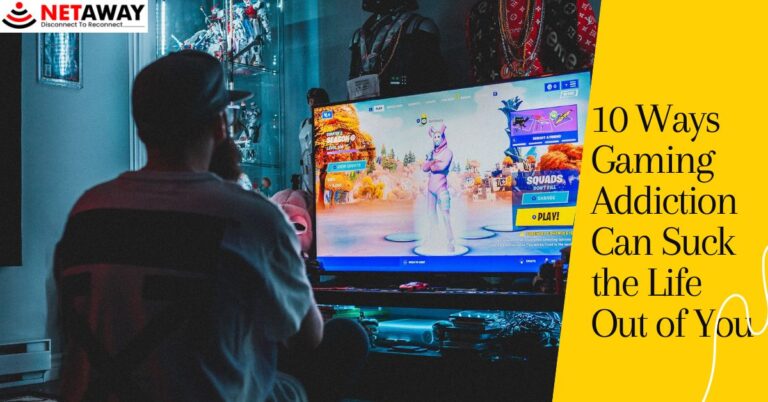
In the digital age, video games have become an essential aspect of modern entertainment. While games can deliver joyful emotions and a sense of accomplishment when used excessively, they can also have detrimental consequences. This article investigates the detrimental effects of gaming addiction on a person’s general well-being and outlines ten ways it can save your life.
1. Mental Health Struggles
Addiction to video games can lead to mental health problems such as anxiety and sadness. Virtual world refuges can help people deal with real-world concerns, intensify existing mental health issues, and possibly raise new ones.
2. Academic and Professional Decline
Overplay can have a serious negative effect on performance and learning. Your career and future chances may suffer if you neglect your obligations at work or school. Learning and job advancement might be hampered by a decline in productivity and concentration.
3. Physical Health Deterioration
Playing while seated for extended periods of time might result in a sedentary lifestyle and a number of health problems. Absence of exercise raises the chance of gaining weight, vascular issues, heart disease, diabetes, and other chronic diseases.
4. Sleep Disturbances
Addictive games can disrupt sleep patterns, leading to insomnia and poor sleep patterns. Late-night games and excessive mental stimulation can make it difficult to adequately relax and unwind, affecting both health and cognitive function
5. Financial Strain
In-game purchases, subscriptions, and gaming equipment can be costly, especially when left unattended. Addictive gaming can lead to rapid spending, accumulation of debt and financial strain, which in turn causes stress and affects overall financial well-being
6. Neglecting Personal Hygiene
Personal hygiene may be neglected as a result of extreme activities. Playing with others can take priority over simple self-care chores, resulting in bad grooming and possible health hazards.
7. Strained Relationships
Gaming addiction can harm ties to friends, family, and other loved ones. Apathy, poor communication, or arguments over recreation can all cause conflict, which can cause emotional distance and strained relationships.
8. Escapism and Emotional Numbing
Some people use gaming as a coping method to avoid difficult to handle emotions or difficulties in the real world. This reliance on games to deal with emotional trauma can obstruct personal development and self-discovery, inhibiting the development of practical coping mechanisms.
9. Cognitive and Behavioral Changes
Cognitive skills including focus, memory, and decision-making can be impacted by addictive games. Additionally, aggressive or impulsive actions displayed during active play may also transfer to actual life circumstances, resulting in conflict and unfavorable outcomes.
10. Inability to Manage Time
Playing addictive video games might lead to poor time management skills. It might be challenging to successfully manage time allocation to other critical chores and duties when hours spent playing games seem like minutes.
Some additional tips
- Set a daily goal for how long you’ll spend playing and stick to it.
- Stop acting for a while. Avoid being overly sedentary by getting up and moving around every 30 to 60 minutes.
- Don’t limit yourself to playing. Make careful to balance your gaming with other activities, such as spending time with friends and family, exercising, or engaging in hobbies that are not related to your game.
- Do not be afraid to ask for assistance if you are concerned about a gaming addiction.You can use tools to aid in getting back on track.
Conclusion
While engaging in sports can be rewarding and pleasurable, many sports can have a detrimental effect on one’s physical, emotional, and social wellbeing. Recognizing the warning symptoms of addiction is crucial, as is taking action to strike a good balance between play and other facets of life. You may beat your gaming addiction and live a more balanced and satisfying life by getting support from friends, family, or coworkers. In the digital era, it’s crucial to keep in mind that humility is essential and prioritizing personal wellbeing is crucial.
FAQs
Do video games affect your brain?
Video games do have an impact on the brain. They can increase hand-eye coordination, problem-solving abilities, and cognitive processes. But prolonged gaming, especially with certain kinds of games, can have negative consequences like shortening attention span, altered brain activity, and perhaps even desensitization to violence.
Do video games cause depression?
While playing too many video games, especially alone oneself, may not directly cause depression, it might contribute to the onset or worsening of depressed symptoms. Gaming addiction can cause social withdrawal, responsibility neglect, and emotional separation, all of which could have an adverse effect on mental health.
Is 3 hour of gaming good?
As long as it doesn’t interfere with other important elements of life like employment, education, social connections, and physical activity, three hours of gaming each day can be appropriate for some people. The issue is moderation; playing video games excessively can have detrimental effects on one’s physical and mental health as well as everyday obligations.
Is it OK to be addicted to gaming?
No, having a gaming addiction is not acceptable. An individual’s physical health, mental health, social life, and overall quality of life can all suffer from gaming addiction. To lead a happy, balanced life, it’s crucial to seek support and strike a good balance with gaming.
Is 1 hour of gaming too much?
For many people, one hour of gaming every day is reasonable, providing it doesn’t interfere with other crucial duties. However, the amount of time that is considered appropriate for gaming depends on the individual, their age, their obligations, and their tastes. To maintain a healthy balance between gaming and other elements of life, self-awareness and moderation are essential.
